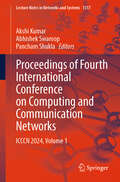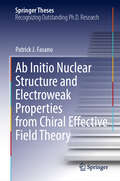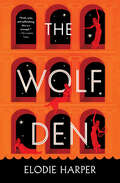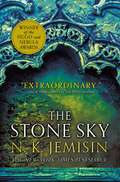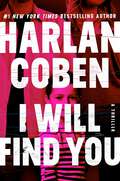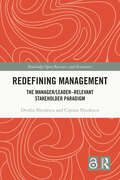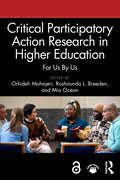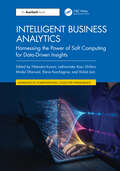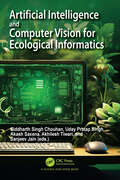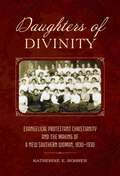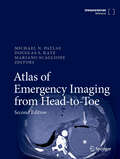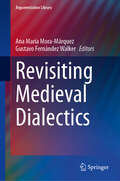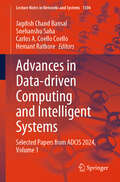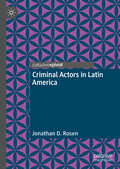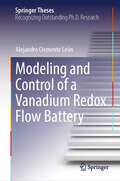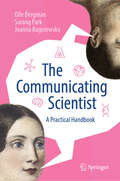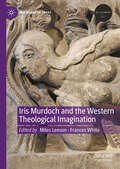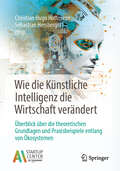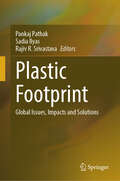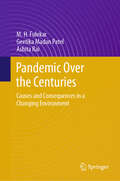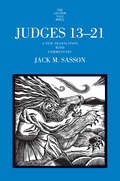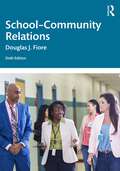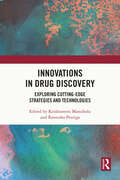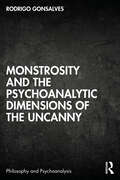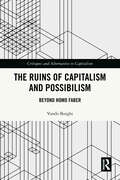- Table View
- List View
Proceedings of Fourth International Conference on Computing and Communication Networks: ICCCN 2024, Volume 1 (Lecture Notes in Networks and Systems #1317)
by Akshi Kumar Abhishek Swaroop Pancham ShuklaThis book includes selected peer-reviewed papers presented at fourth International Conference on Computing and Communication Networks (ICCCN 2024), held at Manchester Metropolitan University, UK, during 17–18 October 2024. The book covers topics of network and computing technologies, artificial intelligence and machine learning, security and privacy, communication systems, cyber physical systems, data analytics, cyber security for industry 4.0, and smart and sustainable environmental systems.
Ab Initio Nuclear Structure and Electroweak Properties from Chiral Effective Field Theory (Springer Theses)
by Patrick J. FasanoThis thesis presents a consistent application of chiral effective field theory (EFT) interactions and currents to obtain ab initio results for light nuclei magnetic dipole and Gamow-Teller strengths in light nuclei (A≤17). Recent results have demonstrated the importance of chiral EFT corrections for correctly predicting magnetic dipole and Gamow-Teller strengths in nuclei. However, these studies have not consistently applied the same treatment to these operators as is applied to the interaction. In this work, it is found that the inclusion of chiral EFT corrections to the magnetic dipole and Gamow-Teller operators generally brings the calculated results closer to agreement with experiment. However, this work also demonstrates that the convergence of the solution to the many-body problem still poses substantial difficulties. This work has confirmed that the inclusion of chiral EFT corrections is necessary to describe light nuclei, while concluding that higher-order corrections are necessary in order to obtain good agreement with experimental data.
The Wolf Den (Wolf Den Trilogy #1)
by Elodie Harper#1 London Times Bestseller &“A gripping historical story.&” —The Independent &“This powerful . . . trilogy opener beautifully walks the line between gutting and hopeful.&” —BuzzFeed, Best Books of March 2022 Sold by her impoverished mother. Enslaved in an infamous brothel in Pompeii. Determined to fight for her freedom at all costs. . . . Enter into the Wolf Den.Amara was once the beloved daughter of a doctor in Greece, until her father&’s sudden death plunged her mother into destitution. Now Amara is a slave and prostitute in Pompeii&’s notorious Wolf Den brothel or lupanar, owned by a cruel and ruthless man. Intelligent and resourceful, she is forced to hide her true self. But her spirit is far from broken. Buoyed by the sisterhood she forges with the brothel&’s other women, Amara finds solace in the laughter and hopes they all share. For the streets of the city are alive with opportunity—here, even the lowest-born slave can dream of a new beginning. But everything in Pompeii has a price. How much will Amara&’s freedom cost her? The Wolf Den is the first in a trilogy of novels about the lives of women in ancient Pompeii.
The Stone Sky (The Broken Earth #3)
by N. K. JemisinHumanity will finally be saved or destroyed in the shattering conclusion to the post-apocalyptic and highly acclaimed NYT bestselling trilogy that won the Hugo Award three years in a row.The Moon will soon return. Whether this heralds the destruction of humankind or something worse will depend on two women.Essun has inherited the power of Alabaster Tenring. With it, she hopes to find her daughter Nassun and forge a world in which every orogene child can grow up safe. For Nassun, her mother's mastery of the Obelisk Gate comes too late. She has seen the evil of the world, and accepted what her mother will not admit: that sometimes what is corrupt cannot be cleansed, only destroyed.
I Will Find You
by Harlan CobenIn this breathtaking thriller from a New York Times bestselling author, an innocent father serving life for the murder of his own son receives evidence that his child may still be alive—and must break out of prison to find out the truth. David Burroughs was once a devoted father to his three-year-old son Matthew, living a dream life just a short drive away from the working-class suburb where he and his wife, Cheryl, first fell in love—until one fateful night when David woke to discover Matthew had been murdered while David was asleep just down the hall. Half a decade later, David&’s been wrongly accused and convicted of the murder, left to serve out his time in a maximum-security prison—a fate which, grieving and wracked with guilt, David didn&’t have the will to fight. The world has moved on without him. Then Cheryl&’s younger sister, Rachel, makes a surprise appearance during visiting hours bearing a strange photograph . . . in the background, just barely in frame, is a boy bearing an eerie resemblance to David&’s son. David just knows: Matthew is still alive. David plans a harrowing escape, determined to achieve the impossible–save his son, clear his own name, and discover the real story of what happened. But with his life on the line and the FBI following his every move, can David evade capture long enough to reveal the shocking truth?
Redefining Management: The Manager/Leader-Relevant Stakeholder Paradigm (Routledge Open Business and Economics)
by Ovidiu Nicolescu Ciprian NicolescuRedefining Management: The Manager/Leader–Relevant Stakeholder Paradigm presents a groundbreaking shift in management philosophy, theory, and practice, introducing the innovative concept of the manager/leader–relevant stakeholder.This paradigm challenges the traditional manager–subordinate model and offers a holistic approach to organizational management and performance management theory and practice. Drawing on digital transformation, artificial intelligence, and intellectual capital, this book reshapes approaches, policies, decision-making processes and provides insights into organizational strategies, leadership, human resources management, and sustainable performance in the context of the new paradigm.This book presents a revolutionary vision for management, offering practical strategies to navigate the complexities of the modern business landscape and foster sustainable growth. It assists academics, researchers, and students in updating their approaches and promoting sustainable development through innovative management practices and may equip professionals and practitioners with collaborative, creative, and flexible approaches to enhance organizational functionality and address societal challenges.The Open Access version of this book, available at http://www.taylorfrancis.com, has been made available under a Creative Commons Attribution-Non Commercial-No Derivatives (CC BY-NC-ND) 4.0 license.
Critical Participatory Action Research in Higher Education: For Us By Us
by Orkideh Mohajeri, Roshaunda L. Breeden and Mia OceanA must-have resource, Critical Participatory Action Research in Higher Education brings together real examples, case studies, and learning materials to guide the use of critical action research methodologies. This timely book catalogues efforts to affect change in our own communities, and invites readers to consider how action research has been conducted in U.S. colleges and universities by minoritized and marginalized scholars. In particular, it highlights those projects that have been led by Scholars of Color, queer scholars, disabled scholars, and other racially minoritized scholars, with an explicit aim to raise up and attend to the needs of our communities. An important text for education graduate programs, this book provides a roadmap for community-engaged work, includes framing theory to help new researchers apply this work to college and university settings, and provides rich features such as cases and sample datasets and other tools for use in Research courses.Chapter 2 of this book is freely available as a downloadable Open Access PDF at http://www.taylorfrancis.com under a Creative Commons Attribution-Non Commercial-No Derivatives (CC BY-NC-ND) 4.0 license.
Intelligent Business Analytics: Harnessing the Power of Soft Computing for Data-Driven Insights (Advances in Computational Collective Intelligence)
by Lakhwinder Kaur Dhillon Nitendra Kumar Mridul DharwalThis book explores the transformative role of soft computing methods in increasing business analytics, providing a comprehensive look into how these advanced methods can be applied to complex business data for meaningful insights. Through the integration of neural network, fuzzy logic, genetic algorithms, artificial intelligence, machine learning, deep learning, and other innovative approaches, Intelligent Business Analytics: Harnessing the Power of Soft Computing for Data- Driven Insights presents a roadmap for leveraging computational intelligence in diverse areas of business decision- making.Readers will venture from predictive analytics and customer segmentation to real- time decision support systems and many other applications. Soft computing’s flexibility and applicability in the handling of uncertainty, ambiguity, and dynamic data environments shine throughout the book. Each chapter is created to be a base of theory and, at the same time, provide an applied example, so the book is appropriate for students, researchers, and professionals in the field.This book also discusses where the markets are heading and new applications that are in store for intelligent analytics to create a competitive advantage that also supports sustainable growth. At the end, this book is for those who want to learn more about using data-driven approaches and those who are ready to face the changes of the fast-evolving digital world.
Artificial Intelligence and Computer Vision for Ecological Informatics
by Sanjeev Jain Akhilesh Tiwari Siddharth Singh Chouhan Uday Pratap Singh Akash SaxenaEcological informatics, more commonly known as Ecoinformatics, is the study of environmental sciences and ecological information. It is an emerging interdisciplinary framework for the management, analysis, and synthesis of ecological data with the help of advanced computational intelligence algorithms. Management in this context is data acquisition, preprocessing, and sharing the data. Analysis and synthesis are the process of extracting useful information and forecasting with the help of intelligent algorithms.The aim of this book is to encapsulate concepts and theories of artificial intelligence and computer vision algorithms used for the evaluation of various ecological informatics applications. It focuses on soft computing, machine learning, deep learning, artificial intelligence, bio-inspired algorithms, data analysis tools, data visualization tools, and computer vision algorithms used in ecological informatics. The book covers remote sensing applications, water bodies evaluation, agriculture mapping, aquatic mapping, forest management, and terrestrial ecosystems.The book will be useful to students, researchers, scientists, and field experts in directing their work towards this domain, to deliver and design models and prototypes for the benefit of society and the environment.
Daughters of Divinity: Evangelical Protestant Christianity and the Making of a New Southern Woman, 1830-1930
by Katherine E. RohrerKatherine E. Rohrer’s Daughters of Divinity tells the story of how well-educated white women of the South used evangelical Protestant Christianity as an instrument to expand their intellectual and professional capacities as well as their agency and influence at home and throughout the world between 1830 and 1930.
Atlas of Emergency Imaging from Head-to-Toe
by Mariano Scaglione Douglas S. Katz Michael N. PatlasThis new reference work provides a comprehensive and modern approach to the imaging of numerous non-traumatic and traumatic emergency conditions affecting the human body. It reviews the latest imaging techniques, related clinical literature, and appropriateness criteria/guidelines, while also discussing current controversies in the imaging of acutely ill patients. The first chapters outline an evidence-based approach to imaging interpretation for patients with acute non-traumatic and traumatic conditions, explain the role of Artificial Intelligence in emergency radiology, and offer guidance on when to consult an interventional radiologist in vascular as well as non-vascular emergencies. The next chapters describe specific applications of Ultrasound, Magnetic Resonance Imaging, radiography, Multi-Detector Computed Tomography (MDCT), and Dual-Energy Computed Tomography for the imaging of common and less common acute brain, spine, thoracic, abdominal, pelvic and musculoskeletal conditions, including the unique challenges of imaging pregnant, bariatric and pediatric patients. There are two new sections for 2nd edition. One section is devoted to imaging of emergency conditions in geriatric patients. The second section covers special considerations in emergency imaging including imaging of intimate partner violence and emergencies in transplant patients. Written by a group of leading North American and European Emergency and Trauma Radiology experts, this book will be of value to emergency and general radiologists, to emergency department physicians and related personnel, to obstetricians and gynecologists, to general and trauma surgeons, as well as trainees in all of these specialties.
Revisiting Medieval Dialectics (Argumentation Library #44)
by Ana María Mora-Márquez Gustavo Fernández WalkerThis book presents a collection of essays by prominent young researchers and established scholars on the medieval reception of Aristotle&’s Topics in the Latin, Arabic and Hebraic traditions, as well as on its late-ancient sources in Alexander of Aphrodisias and Boethius. The book thus provides a fruitful engagement with the late-ancient to medieval reception of the Topics, a tradition that has been understudied in recent scholarship. The collected contributions revisit the reception of the Topics focusing on historical analyses of dialectics as a general method of argumentation and as a scientific method. The authors studied in this book range from well-known figures such as Alexander, Boethius, Buridan and Avicenna, to the lesser-known Radulphus Brito, Judah ben Shlomo ha Kohen, and Ibn Tumlus. This book is an important contribution to the study of argumentation theory in the historical past and is of interest to scholars of the historical development of dialectical argumentation and argumentation theorists.
Advances in Data-driven Computing and Intelligent Systems: Selected Papers from ADCIS 2024, Volume 1 (Lecture Notes in Networks and Systems #1304)
by Jagdish Chand Bansal Carlos A. Coello Coello Snehanshu Saha Hemant RathoreThis book is a collection of best-selected research papers presented at the International Conference on Advances in Data-driven Computing and Intelligent Systems (ADCIS 2024) held at BITS Pilani, K K Birla Goa Campus, Goa, India, during September 20–21, 2024. It includes state-of-the-art research work in the cutting-edge technologies in the field of data science and intelligent systems. The book presents data-driven computing; it is a new field of computational analysis which uses provided data to directly produce predictive outcomes. The book is useful for academicians, research scholars, and industry persons.
Criminal Actors in Latin America
by Jonathan D. RosenThis book seeks to serve as a short primer to students and individuals seeking to understand criminal organizations in Latin America. This work examines who are the major criminal actors in numerous countries across the region, including Mexico, Colombia, Honduras, El Salvador, Brazil and Argentina. It explores transnational organized crime groups like the Sinaloa Cartel, which operates in numerous countries and is involved in a plethora of illicit activities. It also explores more regional cartels as well as gangs and other criminal actors. Each chapter highlights the leadership of the various organizations, and how these criminal groups evolved over time. It utilizes Department of Justice documents, scholarly works, and accounts from journalists to provide intricate details about a litany of key players in the criminal underworld.
Modeling and Control of a Vanadium Redox Flow Battery (Springer Theses)
by Alejandro Clemente LeónThis book presents extensive work on the modeling and control aspects of the emerging field of vanadium redox flow batteries. After providing a detailed literature review, it describes a comprehensive model that defines the main phenomena associated with vanadium redox flow batteries, covering electrochemical, thermal, hydraulic, and voltage aspects. Phenomena and models are described in a concise manner using a set of differential equations that share common parameters and states. Various electrochemical models based on conservation principles and operating condition assumptions are described, and used for estimating the state of charge and state of health. Different methodologies for accurately estimating these indicators through offline optimization problems and online observers are presented. In turn, the results obtained from real experimental setups are presented and validated, providing a better understanding of the components, design, and operation of vanadium redox flow batteries.
The Communicating Scientist: A Practical Handbook
by Joanna Bagniewska Olle Bergman Sarang ParkAre you a researcher, science professional, or student looking to communicate more clearly and effectively in academia and beyond? The Communicating Scientist has got you covered! This essential guide consists of three easy-to-navigate sections: 1. Theoretical Framework: Plant your feet into a robust foundation that draws on areas from ancient rhetoric to modern psychology, while incorporating insights from marketing, social media, and journalism. This section equips you with the "why" behind effective communication. 2. Core Skills and Techniques: Build a central toolkit for communication activities of science and tech professionals, along with practical tips and suggestions. 3. A Practical Recipe Book: Get step-by-step instructions and hands-on tips from experts for 24 specific communication scenarios, as diverse as writing a grant proposal, developing an elevator pitch, doing a media interview, or curating an online presence. This handbook isn't just another academic communication guide. The Communicating Scientist draws on the knowledge, experience, and tricks of the trade from professional communicators, while remaining strongly rooted in a scientific context. It will help you with scientific peer-to-peer communication, disseminating research to the general public, and collaborating with external partners. Written in a conversational and approachable style, The Communicating Scientist is accessible and appropriate for Communicating Scientists at all stages of their professional journey.
Iris Murdoch and the Western Theological Imagination (Iris Murdoch Today)
by Miles Leeson Frances WhiteScholarly interest in theological aspects of Murdoch’s fiction and philosophy took off slowly. It was thirty years after her writing debut that the first work taking detailed notice of the theological language deployed by this overtly-atheist author appeared, and it was a further decade before theologians began to engage with Murdoch’s work together. But it was not until the twenty-first century that this aspect of Murdoch’s thought and imagination began to receive sustained attention. This collection seeks to build on this foundation, begun forty years ago, and to expand the work in this area of Murdoch studies which has lately been gathering momentum. This project consolidates earlier discussion of the vital part theology plays in Murdoch’s thought, and then takes the debate in new directions. Contributors include a wide range of current Murdoch scholars from diverse disciplines who develop debate about this subject in a variety of innovative and fruitful ways, to inspire future works in this area of Murdoch studies.
Wie die Künstliche Intelligenz die Wirtschaft verändert: Überblick über die theoretischen Grundlagen und Praxisbeispiele entlang von Ökosystemen
by Christian Hugo Hoffmann Sebastian HersbergerBeiträge von renommierten Expert*innen untersuchen auf verständliche Weise kritisch die Geschichte der Künstlichen Intelligenz (KI), ihre aktuellen und künftigen Fähigkeiten, Einschränkungen sowie ethischen Implikationen und Bedenken. Es handelt sich um ein Buch von Praktizierenden für Praktizierende, gezeichnet von echten Insidermeinungen, die mit einer ausgewogenen Perspektive zu Erfolgen, Hoffnungen, Ängsten und Debatten über KI schreiben. Dieses Buch ist eine großartige Ressource, die langjährige Erfahrung von Branchenkundigen und Branchenführenden beinhaltet. Die Herausgeber widmen sich Anwendungspotenzial und -beispielen mit Fokus auf Relevanz und breite Umsetzbarkeit, entlang der Wertschöpfungskette und sich formender Ökosysteme.
Plastic Footprint: Global Issues, Impacts and Solutions
by Sadia Ilyas Pankaj Pathak Rajiv R. SrivastavaThis book gives a broader framework of plastic pollution, which is a significant issue worldwide. The book emphasizes the primary (plastic waste discharged from the direct source) and secondary pollutants (plastic trash which is disposed of on land and converted to micro and nano plastics in ocean). In addition to this, the volume also addresses the issues of plastic pollution by managing plastic waste in a circular closed loop. The book is divided into three parts: (1) generation and assessment of plastic waste, (2) impact assessment of plastics due to improper management and disposal, (3) sustainable management of plastic waste and converting them into resource.
Pandemic Over the Centuries: Causes and Consequences in a Changing Environment
by M. H. Fulekar Geetika Madan Patel Ashita RaiA pandemic is a global outbreak of new infectious diseases caused by the transmission of emerging and re-emerging pathogens that infect host species. The impact or severity of pandemics is often huge because many individuals lack pre-existing immunity to the new virus. The number of severe cases can increase drastically from endemic levels to that of a pandemic when a large portion of the global population becomes infected. Pandemics can have unusual epidemiological patterns, and large outbreaks may occur under specific conditions based on the nature of the virus. Both manmade and natural disasters can significantly intensify the risk of epidemics; however, pandemics are characterized by exclusive outbreaks with high fatality rates. Throughout history populations all over the world have sporadically faced devastating pandemic outbreaks. It has been observed that, every century, the outbreak of an epidemic caused by a specific virus tends to spread globally as a pandemic. In this context, this book highlights pandemics that have occurred over the centuries. It also examines specific epidemiological patterns and outbreak consequence scenarios across the world. The book aims to enrich the reader's understanding of pandemics by providing valuable insights and knowledge on the preventive measures to be taken in response to pandemic.
Judges 13-21: A New Translation with Commentary (The Anchor Yale Bible Commentaries)
by Jack M. SassonThe second volume of Jack M. Sasson’s authoritative commentary on the book of Judges The second half of Judges is set when “there was no king in Israel; anyone could do whatever felt right.” It narrates the tale of Samson, the would-be liberator of Israel who comes to a violent end; the conquest of the land of Laish; and a vicious rape that, when followed by a shocking dismemberment, ignites a war among the tribes. In the second installment of his authoritative two-volume commentary, Jack M. Sasson invites his readers to ponder the many levels of meaning in the Hebrew text through a careful survey of its contents, evolution, and reception. By situating the text alongside its earliest translations into Greek, Aramaic, and Latin, Sasson offers compelling observations on the characters, action, pacing, and style of the narrative, focusing on the characterization of Samson as a resourceful avenger of Philistine cruelties and as an instrument of God intended to humiliate false divinities. Sasson draws widely on comparative literature from Egypt, Greece, and Mesopotamia to enrich our understanding of how biblical writers adapted older regional sagas; and he derives insights from Hellenistic and rabbinic sources to re-create how Judges was understood by its earliest readers. Comprehensive and engagingly written, Judges 13–21 is an invitation to readers to rediscover these ancient stories and, in so doing, gain a greater appreciation for the art of Hebrew storytelling.
School–Community Relations
by Douglas J. FioreAccessible and practical, the sixth edition of School–Community Relations provides aspiring educational leaders with the skills to establish strong systems for communicating with their various school constituencies and to improve public relations at all levels.This textbook uses real-life examples to illustrate the ways in which administrators and school leaders can effectively engage and enlist partnerships with teachers, staff, students, parents, and community members. Chapters introduce communication and relationship concepts and provide specific examples of how effective educational leaders have put the concepts into practice. Case studies at the end of each chapter apply the strategies to realistic scenarios, and questions for analysis help readers engage critically with the material.New in this sixth edition: Updated strategies for utilizing social media and instructional technology to improve school–community relations and foster a positive school image; Additional coverage of use of AI, expanded discussion of communication during various crises, and attention to standards for the preparation of school leaders; Updated references and literature throughout to reflect the current educational contexts. This book discusses the essential elements of successful school–community relations and centers the importance of keeping the public connected to the schools they share.
Innovations in Drug Discovery: Exploring Cutting-Edge Strategies and Technologies
by Krishnaveni Manubolu Raveesha PeerigaThis fascinating volume delves into the forefront of pharmaceutical research to shed light on the ground-breaking methodologies and technologies driving advancements in drug discovery today.Providing a comprehensive overview of emerging trends and new approaches, it covers the entire drug discovery process, from target identification to clinical development, providing readers with a holistic understanding of the field. Each chapter outlines a different approach, from computational methods and high-throughput screening techniques to the application of artificial intelligence and machine learning in drug design. Additionally, it explores the integration of genomic, proteomic, and metabolomic data in target identification and validation processes, as well as the utilization of CRISPR/Cas9 technology for precision medicine initiatives. Highlighting the potential of interdisciplinary collaborations, elucidating the impact of big data analytics on decision-making processes, this fascinating book will appeal to students and researchers in the pharmaceutical and biotechnological sciences, as well as professionals in this field.
Monstrosity and the Psychoanalytic Dimensions of the Uncanny (Philosophy and Psychoanalysis)
by Rodrigo GonsalvesThis accessible and meticulously researched book is a philosophical study dedicated to the psychoanalytic dimension of the uncanny and the discussions on monstrosity as fundamental concepts to address contemporary experiences of anguish, desire, suffering and alienation.Examining the uncanny in Freud and Lacan, the book explores its emergence through psychoanalysis and aesthetics, as well as its meta-psychological implications. Chapters explore the history and connection between the uncanny and monstrosity in both philosophy and psychoanalysis, following on from the construction of Freud's 'The Uncanny' in 1919, and focusing on these concepts through different perspectives, such as Marxism. Finally, the book argues towards the importance of a monstrous grammar (re)introduced to psychoanalysis, in order to sustain a specific clinical listening of our times.Offering new insights and arguments on these fascinating concepts, this book will be of interest to philosophers, psychoanalysts and psychologists, as well as also appealing to professionals and students in the worlds of arts, film and history.
The Ruins of Capitalism and Possibilism: Beyond Homo Faber (Critiques and Alternatives to Capitalism)
by Vando BorghiThis book explores two themes in connection with contemporary capitalism: infrastructural capitalism as the most advanced phase of a modernity, of which the “workman” or homo faber is the embodiment, who exists within an infrastructure whose logic of connectivity is aimed at value extraction; and a landscape of ruins – in the form of symbolic misery, the Anthropocene and a process of refeudalisation – that the homo faber has been piling up around himself as a result. In response to this dynamic, the author elaborates a social, cultural and political project – a “design hope” of both material and immaterial dimensions – that adopts the perspective of possibilism: an outlook that eschews ever greater social and environmental costs in the name of future “development” but seeks a logic of reproduction based on a real politics of care in the form of generalised social action. The Ruins of Capitalism and Possibilism will therefore appeal to scholars of social and political theory with interests in critiques of capitalism and alternative futures.
